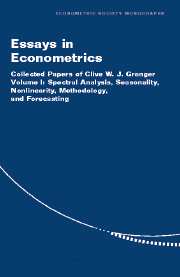Book contents
- Frontmatter
- Contents
- Acknowledgments
- List of Contributors
- Introduction
- 1 The ET Interview: Professor Clive Granger
- PART ONE SPECTRAL ANALYSIS
- PART TWO SEASONALITY
- PART THREE NONLINEARITY
- PART FOUR METHODOLOGY
- PART FIVE FORECASTING
- 17 Estimating the Probability of Flooding on a Tidal River
- 18 Prediction with a Generalized Cost of Error Function
- 19 Some Comments on the Evaluation of Economic Forecasts
- 20 The Combination of Forecasts
- 21 Invited Review: Combining Forecasts – Twenty Years Later
- 22 The Combination of Forecasts Using Changing Weights
- 23 Forecasting Transformed Series
- 24 Forecasting White Noise
- 25 Can We Improve the Perceived Quality of Economic Forecasts?
- 26 Short-Run Forecasts of Electricity Loads and Peaks
- Index
19 - Some Comments on the Evaluation of Economic Forecasts
Published online by Cambridge University Press: 06 July 2010
- Frontmatter
- Contents
- Acknowledgments
- List of Contributors
- Introduction
- 1 The ET Interview: Professor Clive Granger
- PART ONE SPECTRAL ANALYSIS
- PART TWO SEASONALITY
- PART THREE NONLINEARITY
- PART FOUR METHODOLOGY
- PART FIVE FORECASTING
- 17 Estimating the Probability of Flooding on a Tidal River
- 18 Prediction with a Generalized Cost of Error Function
- 19 Some Comments on the Evaluation of Economic Forecasts
- 20 The Combination of Forecasts
- 21 Invited Review: Combining Forecasts – Twenty Years Later
- 22 The Combination of Forecasts Using Changing Weights
- 23 Forecasting Transformed Series
- 24 Forecasting White Noise
- 25 Can We Improve the Perceived Quality of Economic Forecasts?
- 26 Short-Run Forecasts of Electricity Loads and Peaks
- Index
Summary
INTRODUCTION
At the present time, a good deal of effort and expenditure is being spent on the production of economic forecasts. There exists a wide range of forecasting techniques, from sophisticated regression procedures to naïver models or intuitive guesses, and it would seem essential for forecasters to attempt to assess the success or otherwise of such exercises. In this context, the two relevant questions are how good (in some sense) is a particular set of forecasts and can the forecasting procedure be modified to yield an improved performance. One element of the first question might be an enquiry as to whether or not better forecasts are being achieved by some other forecaster. Most of the available techniques for evaluating forecasts are almost entirely concerned with discovering the “best” forecasting methods from some set or, equivalently, in ranking methods. We shall argue that much of this work has little or no operational significance and that a wider viewpoint is required.
An analysis of forecast performance can be carried out at two levels. At the subjective level, one might look particularly closely at any very large forecast errors which have been made, and attempt to assess in retrospect what underlying conditions led to such errors and whether or not such conditions could have been foreseen at the time the forecasts were made. If they could, then allowance for these possibilities should be made in future forecasting exercises.
- Type
- Chapter
- Information
- Essays in EconometricsCollected Papers of Clive W. J. Granger, pp. 375 - 390Publisher: Cambridge University PressPrint publication year: 2001



